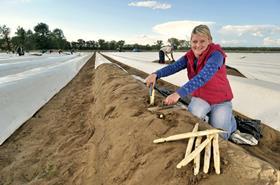
Technological advances being made in the Germany's asparagus sector are reportedly bringing forward the start of the season, according to reports. While the country's beloved asparagus season – or Spargelzeit – traditionally begins around mid-April, modern production and harvesting methods, including the use of so-called ‘sun tunnels’, mean the vegetable can in fact be on supermarket shelves as early as late March.
'We will begin our asparagus season early,' said Sven Hager, production manager at the Klaistow asparagus farm operated by Buschmann Winkelmann, in an interview with Berlin-based tabloid BZ. The Klaistow operation is one of a large number of similar farms located in Beelitz, an asparagus-producing heartland in the region of Brandenburg just south of the German capital. Like others, Buschmann Winkelmann runs a regular shuttle service to bring in residents of nearby Berlin and Potsdam in order to buy new-season produce.
However, this year's colder weather has meant additional measures have been required to ensure the initial open-field crop survives, including placing transparent sheets over the ground even earlier than usual to increase the tempeature beneath and prompt spears to appear. Such techniques apparently allow harvesters to produce a crop up to a month and a half earlier than normal.
The extent to which such processes are employed in the German asparagus sector remains, however, very limited, with only around 40ha of Brandenburg's entire vegetable production under glass, for example. Brandenburg is one of Germany's main asparagus-producing regions and last year it continued to expand its planted area, harvesting around 53 tonnes per hectare from a total production area of 2,850ha, according to data provided by the Ministry of Agriculture.
Germany's overall output averaged around 52 tonnes per hectare in 2012, down from just under 56 tonnes per hectare in 2011. The country's largest production area, Lower Saxony, saw its crop fall by 19 per cent last season to 21,400 tonnes, while the next-biggest producer North Rhine-Westphalia rose 6 per cent year on year to 15,800 tonnes.



